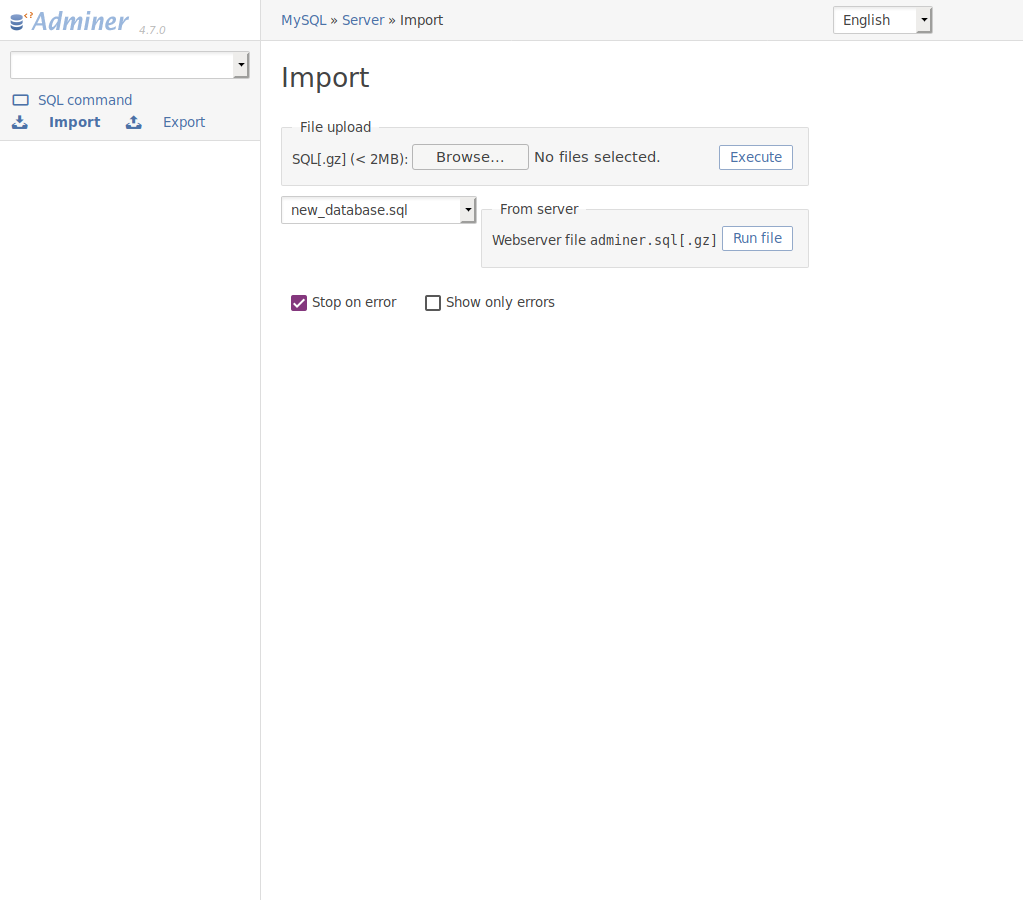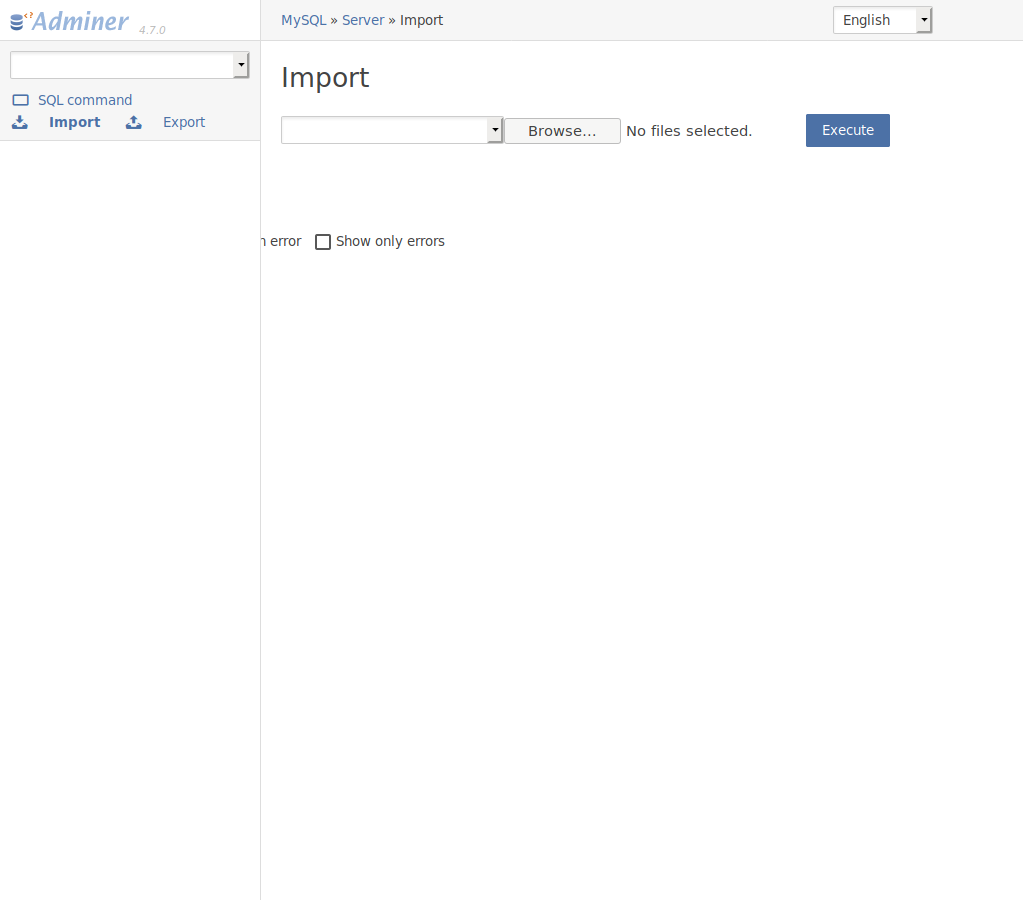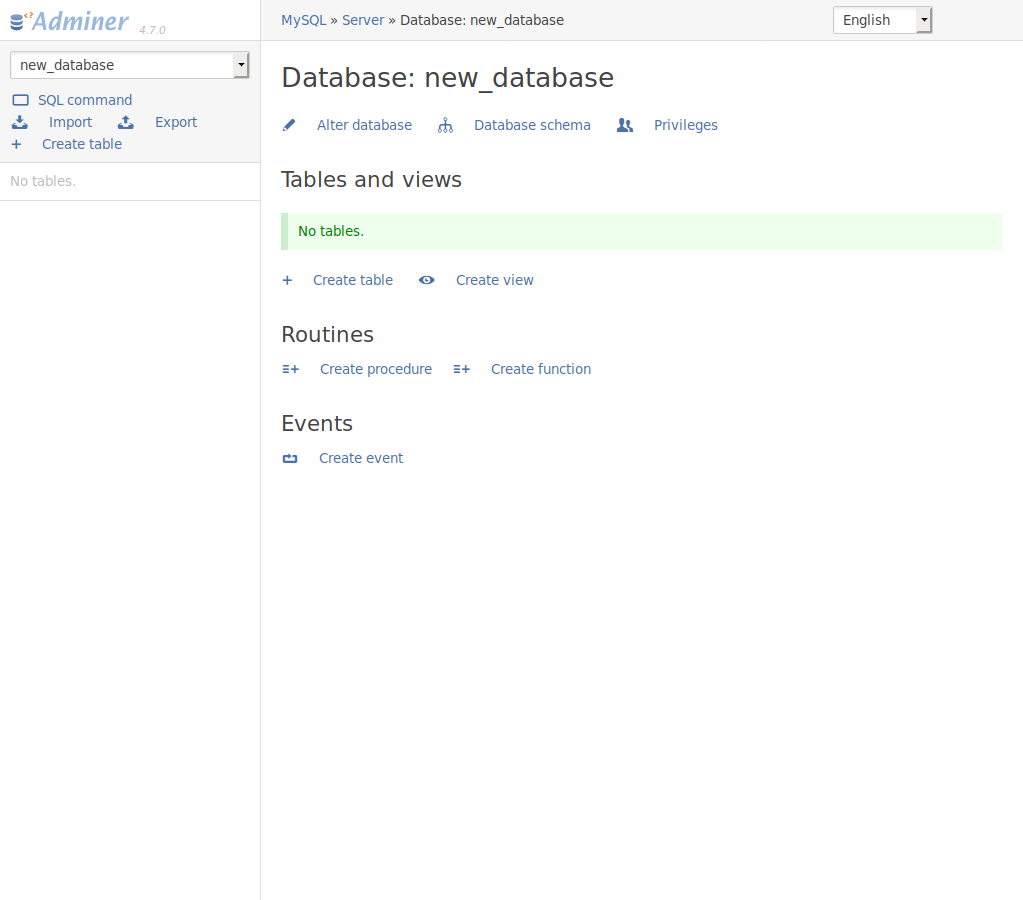-
-
Save joshcangit/ad28f82baf1c9c2fab22dd9e8f39f799 to your computer and use it in GitHub Desktop.
| <?php | |
| /** | |
| * Import SQL files from a directory | |
| * | |
| * @author joshcangit, https://github.com/joshcangit | |
| * @author Roy-Orbison, https://github.com/Roy-Orbison | |
| */ | |
| class AdminerImportFromFolder { | |
| protected $dir; | |
| /** | |
| * @param string $dir optional directory to read from, other than Adminer's current working dir. | |
| */ | |
| function __construct($dir = '') { | |
| $dir = (string) $dir; | |
| if ($dir != '') { | |
| $dir = rtrim($dir, DIRECTORY_SEPARATOR) . DIRECTORY_SEPARATOR; | |
| } | |
| $this->dir = $dir; | |
| } | |
| protected function _readFiles($gz = false) { | |
| $mapped = array(); | |
| $glob = "$this->dir*.[Ss][Qq][Ll]"; | |
| if ($gz) { | |
| $suffix = '.gz'; # lowercase only because of core | |
| $glob .= $suffix; | |
| $suffix_cut = -3; | |
| } | |
| if ($files = glob($glob)) { | |
| $from = strlen($this->dir); | |
| foreach ($files as $file) { | |
| if ($from) { | |
| $file = substr($file, $from); # do not expose server paths in output | |
| } | |
| if ($gz) { | |
| $mapped[substr($file, 0, $suffix_cut)] = $file; | |
| } | |
| else { | |
| $mapped[$file] = $file; | |
| } | |
| } | |
| } | |
| return $mapped; | |
| } | |
| function importServerPath() { | |
| static $posted = null; | |
| $files = $this->_readFiles(); | |
| if (extension_loaded('zlib')) { | |
| $files += $this->_readFiles(true); # core prioritises files without .gz | |
| } | |
| if (count($files) > 1) { | |
| ksort($files); | |
| } | |
| if ($posted !== null || !isset($_POST['webfile'])) { | |
| # use existing translation strings | |
| echo "<fieldset><legend>" . lang('From server') . "</legend><div>"; | |
| echo lang('Webserver file %s', '<select name="webfilename">' . optionlist(array('' => lang('Select')) + $files, $posted, true) . '</select>'); | |
| echo ' <input type="submit" name="webfile" value="' . lang('Run file') . '">'; | |
| echo "</div></fieldset>\n"; | |
| $posted = null; | |
| return false; # skip core UI | |
| } | |
| if ( | |
| empty($_POST['webfilename']) | |
| || !is_string($_POST['webfilename']) | |
| || !array_key_exists($_POST['webfilename'], $files) | |
| ) { | |
| $posted = ''; | |
| return 'SELECTED_FILE_DOES_NOT_EXIST'; # can't return empty string because of core file_exists() check | |
| } | |
| $posted = $_POST['webfilename']; | |
| return $this->dir . $posted; | |
| } | |
| } |
Suggestions for improvements are welcome.
Please provide a default value for the parameter in the __construct function to prevent fatal PHP 7.2 error. Using function __construct($folder = null) instead should have it work as it did before while giving newer PHP a default/fallback value since it's always expecting one.
This should now be able to access .sql files in the current directory.
I assumed it should require a folder but I was wrong.
I wonder if anyone knows how to fix that visual glitch.
🤔
Still not perfect, but a little bit better...
<?php
/**
* Import databases from a folder
*
* @author joshcangit, http://github.com/joshcangit/
*/
class AdminerImportFromFolder {
private $folder;
/**
* $folder - directory containing .sql files
*/
function __construct($folder = null){
$this->folder = $folder;
}
function importServerPath() {
?>
<fieldset>
<legend>From folder</legend>
<div>
<select name="file">
<option value=""></option>
<?php
if ($this->folder)
$folder = $this->folder."/";
else
$folder = $this->folder;
// load all .sql files
foreach (glob($folder."*.sql") as $path) {
$file = preg_replace("~(?:.+\/)?(.+\.sql)~", "$1", $path);
?> <option value="<?php echo $path; if ($_POST['file'] == $path) return $_POST['file']; ?>"><?php echo $file; ?></option>
<?php
}
?>
</select>
</fieldset>
<?php
}
}
Thank you very much! 🙏
In that case, would it be alright to use your code?
The Adminer developer has linked to my gist so I'm thinking of updating my code with yours.
May as well. I emailed Jakub, but I think he's a very busy guy. Better to have one linked solution on the official plugins page.
There's a way to merge gists cleanly. (See my note at the bottom.)
May as well. I emailed Jakub, but I think he's a very busy guy. Better to have one linked solution on the official plugins page.
There's a way to merge gists cleanly. (See my note at the bottom.)
Thought about that for a while. I decided to just copy everthing but keep the filename and class name the same.
👍
Drop that close tag though. You don't want the possibility of breaking someone's Adminer install over a style preference.
Drop that close tag though. You don't want the possibility of breaking someone's Adminer install over a style preference.
Now I realize the closing tag wasn't necessary.
how to increase adminer import file limit
how to increase adminer import file limit
🤔
You will need to edit the upload_max_filesize in the php.ini configuration file if you use the Browse... button to actually upload a sql file larger than 2MB.
Thanks to @Roy-Orbison, this plugin replaces the adminer.sql[.gz] with a drop-down menu to select a sql file found in a folder.
I really didn't like how without this plugin, all the databases would need to be in a single file to be imported.
Introduction
I know there would be an error if I uploaded a file for importing that is too large.
I like that I can import .sql database files from a folder like how it is in phpMyAdmin which avoids the upload file size limit problem.
In phpMyAdmin, I can change this setting in config.inc.php. e.g. The folder is called upload.
After that, I made a folder called upload in the phpmyadmin folder and store my .sql files there for easy and convenient importing with no file size limit.
This plugin aims to do just that on Adminer. I find the way it is done on Adminer to be not as convenient. Needing to make a file in the same place as adminer.php called adminer.sql and copy-pasting all the .sql files into that 1 file. I like it in separate files.
Usage
Make a folder within the web root directory to store .sql files for importing.
e.g. The folder in this example is called upload.
Load the plugin specifying the relative path of the folder.
Instructions referenced from https://www.adminer.org/en/plugins/#use
How it looked before update
On selecting a file. In this case, it is a file called new_database.sql made to test this out.



After clicking Run file, the page will look pretty messed up.
Even so, the new database works just fine.
How it looks now